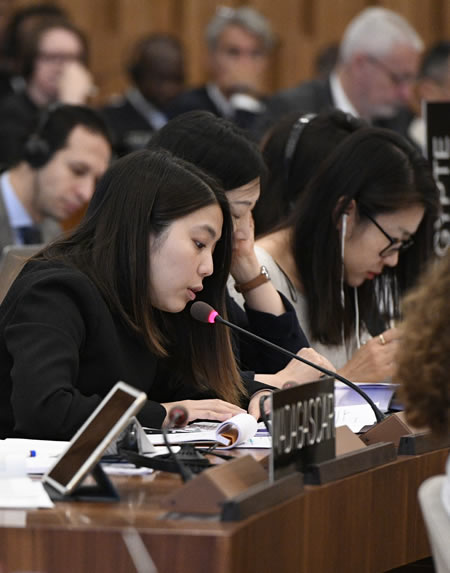« International Conference on Sustainable Water Management at Mohali from Tomorrow | Main | United Nations — Award Ceremony: Diwali - "The Power of One" »
December 12, 2018
First ever Consultation of UNESCO Chairs in India

Photo: A scene from a meeting of the Preparatory Group of the UNESCO Executive Board, UNESCO Headquarters, Paris, France. Image provided by and copyright © UNESCO/Cyril Bailleul. [File Photo]
New Delhi, December 12, 2018 — The UNESCO Office in New Delhi in collaboration with Participatory Research in Asia (PRIA), hosted the first-ever Consultation of UNESCO Chairs, from 10-11 December 2018 in New Delhi. The primary objective of the consultation was to build a more informed and active network of UNESCO Chairs in India and to brainstorm and share ideas on the role of UNESCO Chairs in strengthening the work of UNESCO. The two-day consultation saw the participation by all 11 UNESCO Chairs in India.
On Day 1, the UNESCO New Delhi Director, Eric Falt, welcomed all the participants at UNESCO House, which was followed by the screening of a Film on UNESCO’s 70 years in India. The reception at the UNESCO House was a unique opportunity for all the 11 Chairs present to introduce themselves and to build meaningful networking in an informal setting.
On the second day, the meeting started with an address by Dr. Rajesh Tandon who warmly welcomed all the UNESCO Chairs in India to PRIA campus. UNESCO New Delhi Director, Eric Falt made a presentation highlighting critical activities undertaken by the different sectors in the New Delhi Office. Dr. N. Saravana Kumar, Joint Secretary (ICC), Ministry of Human Resource Development (MHRD) thanked UNESCO for organizing the meeting and highlighted the need to engage meaningfully with the UNESCO Chairs in strengthening the programmes and policies of MHRD.
During the work session, the Chairs brainstormed about enhanced collaboration with UNESCO New Delhi and how they could further UNESCO’s agenda in their respective areas of specialization. The members presented key ideas which included reinforcing the network of UNESCO Chairs by setting up e-groups for enhanced networking and knowledge sharing and promoting core values of UNESCO through their ongoing courses and programmes.
The UNITWIN/UNESCO Chairs Programme consists of the establishment of UNESCO Chairs and UNITWIN (University Twinning and Networking) Networks in higher education institutions. Because of the nature and flexibility of the UNITWIN/UNESCO Chairs Programme, universities can respond more readily and with greater autonomy to the demands for new learning and research in a world undergoing rapid economic, social and technological change. India has established 11 Chairs on different subjects.
Following is the List of Chairs under the UNITWIN/UNESCO Programme —
- UNESCO Chair in Cultural Development (1994), Indira Gandhi National Centre for the Arts, New Delhi
- UNESCO Chair in Peace, Human Rights and Democracy (1998), Academy of Engineering and Educational Research, Pune
- UNESCO Chair in Teacher Education through Distance Mode (1996), Indira Gandhi National Open University (IGNOU), New Delhi
- UNESCO Chair in Biotechnology (2000), Indian Institute of Science in Bangalore, Bangalore
- UNESCO Chair for the Promotion of the Culture of Peace and Non-Violence (1999), Manipal Academy of Higher Education, Pune
- UNESCO-Cousteau Ecotechnie Chair in Ecotechnology (1996), M.S. Swaminathan Research Foundation (MSSRF)
- UNESCO Chair for Peace and Intercultural Understanding (2010), Banaras Hindu University
- UNESCO Chair on Community Media (2011), University of Hyderabad
- UNESCO Chair in Climate Science and Policy (2012), TERI University
- UNESCO Chair in Inclusive Adapted Physical Education and Yoga (2012), Ramakrishna Mission Vivekananda University
- UNESCO Chair on Education for Sustainable Development and the Human Habitat (2013), The Centre for Environment Education and CEPT University
Sources: UNESCO India Office, New Delhi; Indian National Commission for Co-operation with UNESCO
|GlobalGiants.Com|







Edited & Posted by the Editor | 2:42 PM | Link to this Post






